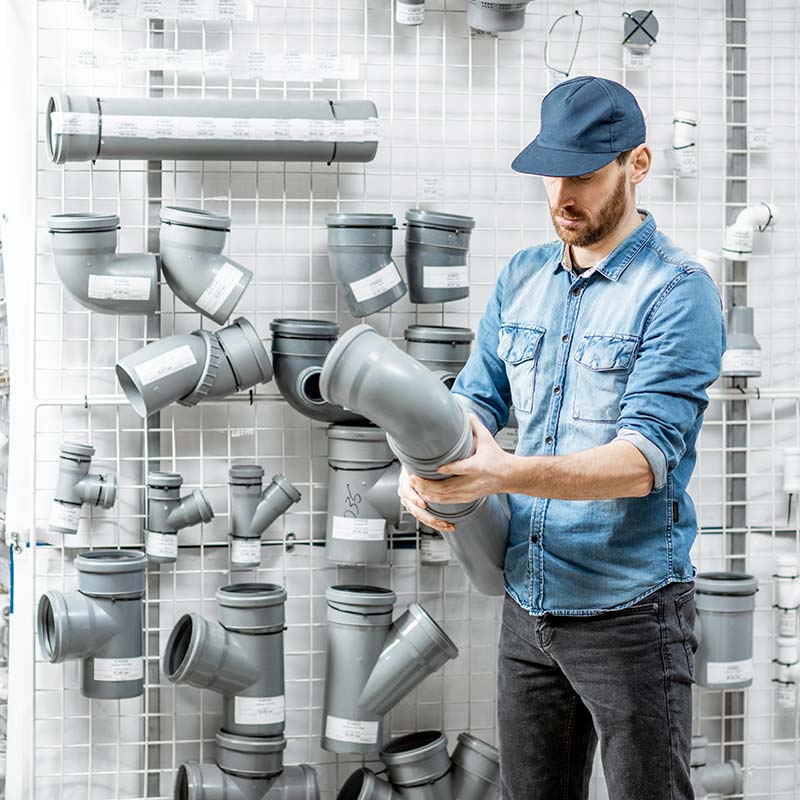When it comes to plumbing, selecting the right type of pipe is crucial for ensuring the efficiency, durability, and safety of your system. With a variety of options available, making an informed decision can be challenging. This guide will walk you through the most common types of plumbing pipes, their pros and cons, and suitable applications to help you make the best choice for your needs.
1. PVC (Polyvinyl Chloride) Pipe
Pros:
- Affordability: PVC pipes are cost-effective.
- Ease of Installation: They are lightweight and easy to handle.
- Corrosion Resistance: PVC is resistant to corrosion and chemicals.
- Versatility: Suitable for both cold and hot water applications.
Cons:
- Temperature Sensitivity: PVC can become brittle in extremely cold temperatures.
- Not Suitable for Drinking Water: Some types are not recommended for potable water.
Best For: Drainage, waste, and vent systems.
2. PEX (Cross-Linked Polyethylene) Pipe
Pros:
- Flexibility: PEX pipes are highly flexible and can be easily bent around corners.
- Freeze Resistance: They can expand and contract, making them resistant to freezing.
- Corrosion Resistance: PEX is resistant to scale and chlorine, reducing maintenance needs.
Cons:
- UV Sensitivity: PEX pipes degrade when exposed to direct sunlight.
- Fittings: Requires special fittings and tools for installation.
Best For: Residential water supply lines, both hot and cold.
3. Copper Pipe
Pros:
- Durability: Copper pipes are long-lasting and reliable.
- Corrosion Resistance: They resist corrosion and can handle high pressure.
- Recyclable: Copper is an environmentally friendly option.
Cons:
- Cost: Copper pipes are more expensive than other options.
- Installation: Requires soldering, which can be labor-intensive.
Best For: Water supply lines, especially in areas with high water pressure.
4. Galvanized Steel Pipe
Pros:
- Strength: Galvanized steel pipes are strong and can handle high pressure.
- Durability: They are durable and long-lasting.
Cons:
- Corrosion: Prone to rust and corrosion over time, especially with hard water.
- Weight: Heavy and difficult to work
Conclusion
Choosing the right type of plumbing pipe is essential for ensuring the efficiency, durability, and safety of your plumbing system. Each type of pipe has its own set of advantages and disadvantages, making it important to consider your specific needs and circumstances.
- PVC pipes are a cost-effective and versatile option, ideal for drainage and vent systems but not always suitable for potable water.
- PEX pipes offer flexibility and resistance to freezing, making them excellent for residential water supply lines.
- Copper pipes provide durability and corrosion resistance, suitable for high-pressure water supply but come with a higher cost.
- Galvanized steel pipes are strong and durable but can be prone to corrosion and are heavy to work with.
- CPVC pipes are designed for hot water applications and offer a cost-effective solution but require careful installation to avoid damage.
When making your decision, consider factors such as water pressure, temperature, water quality, and budget. Consulting with a professional plumber can provide valuable insights and help you make an informed choice tailored to your specific needs. By selecting the right type of pipe, you can ensure the longevity and efficiency of your plumbing system for years to come.
For expert advice and professional installation, consider reaching out to E&K Contractors. With years of experience and a commitment to quality, E&K Contractors can help you navigate the complexities of plumbing choices and ensure that your system is installed correctly and efficiently. Whether you are dealing with a new installation or need to upgrade an existing system, E&K Contractors have the expertise to get the job done right. Contact them today for a consultation and take the first step towards a reliable and efficient plumbing system.

